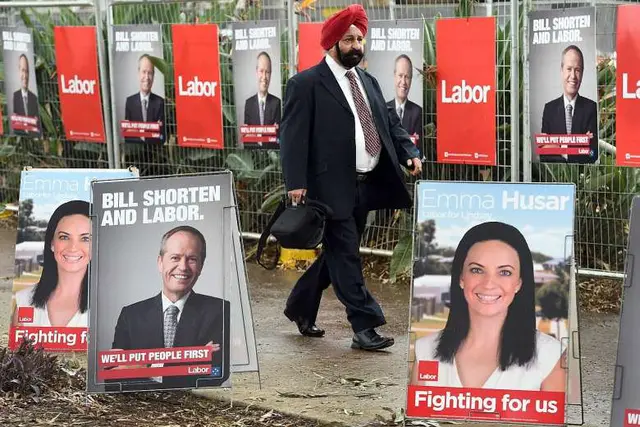Migrants may prove decisive in elections, with many living in crucial battleground seats
At an unusual campaign press conference in Australia last week that went largely unnoticed by the national media, Opposition leader Bill Shorten appeared with his wife Chloe and took questions from a broad range of little-known non-English media outlets.
After posing for photographs with the gathered journalists and editors for about 10 minutes, Mr Shorten, the Labor Party leader, took questions from Vietnamese and Nepali television services, as well as from Muslim, Arabic and Indian media. He later reportedly took separate questions from the local Chinese media, who asked about his position on issues such as the South China Sea dispute and the China-Australia free trade deal, which came into force last December.
Flanked by local Labor candidates from diverse backgrounds, Mr Shorten told the gathering that his party "respects the contribution of immigrant Australians".
"I respect the fact that many generations of immigrants who arrived here have gone and worked in construction, have gone and worked in the factories and the textile mills," he said.
The hour-long press conference came as both Labor and the ruling Liberal-National Coalition seek to appeal directly to ethnic voters ahead of the general election on Saturday.
Large numbers of migrants live in some of the crucial battleground seats, making them an important demographic for both sides.
Labor has run advertisements in about 12 different languages, including Punjabi, Urdu, Korean, Hindi, Bengali and Chinese. It has also run subtitled versions of advertisements to target Italian, Macedonian, Greek and Vietnamese speakers.
The Liberal Party has targeted Chinese-Australian voters, including two press conferences specifically for the Chinese media.
One Liberal MP, Mr Craig Laundy, who holds the marginal Sydney seat of Reid, has reportedly hired Chinese and Korean community liaison officers.
Professor Andrew Jakubowicz of the University of Technology Sydney, an expert on Australian politics and multiculturalism, said Labor, the Coalition and the Greens had all been effective in recent years at reaching out to language-based groups.
But these groups, he told The Straits Times, had a diverse range of political interests. Arabic speakers, for instance, tend to be concerned about Middle East issues and have strong religious elements that are fiercely opposed to the legalisation of same-sex marriage.
In the Chinese-Australian community, he said, people who had arrived in the years since the Tiananmen Square crackdown in 1989 can be "very tetchy about issues around Chinese national honour".
Prof Jakubowicz said the Liberal Party had worked hard in recent years to win back disaffected Chinese voters, who were put off by former prime minister John Howard's perceived hostility to Asian migration.
During the current campaign, both the Coalition and Labor have released policies aimed at migrant communities, such as separate plans to make it easier for parents of residents to receive visas.
These targeted appeals to ethnic voters are not surprising, given Australia's large migrant intake and its diverse population.
About one-quarter of Australia's population of around 24 million was born overseas, with growing numbers of migrants in recent years from Asia, particularly China and India.
The top countries of birth for foreign-born Australians in the last census in 2011 were Britain, New Zealand, China and India. Apart from English, Mandarin, Italian, Arabic and Cantonese are most commonly spoken at home.
(THE STRAITS TIMES)
 简体中文
简体中文

